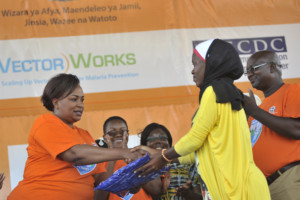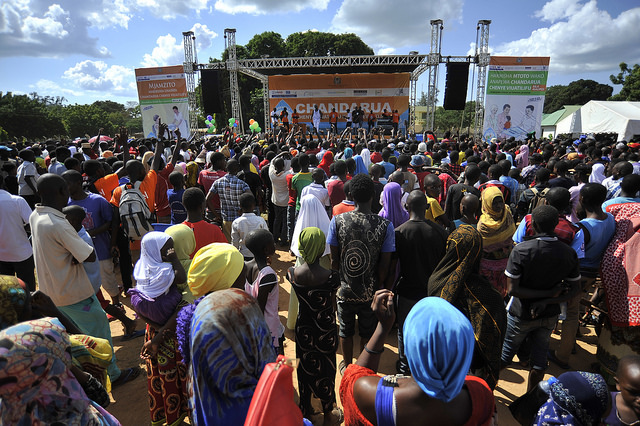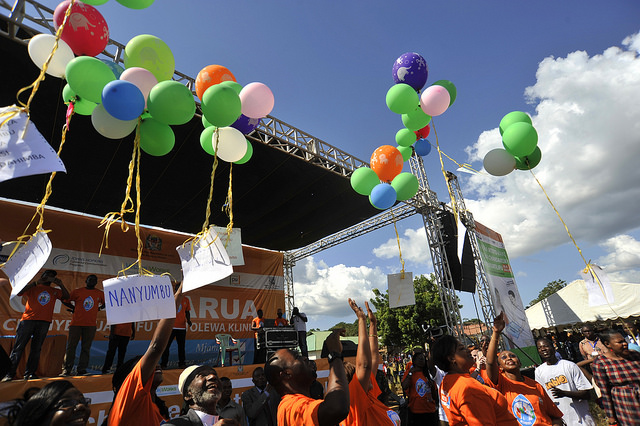
Launch event of the pilot health facility–based ITN distribution in Mtwara, during which, the regional commissioner of Mtwara, Ms. Halima Dendego (left), handed out insecticide-treated nets to women.
Pregnant women are disproportionately affected by malaria. According to the World Health Organization (WHO), “pregnancy reduces a woman’s immunity to malaria, making her more susceptible to malaria infection and increasing the risk of illness, severe anemia, and death.” Malaria in pregnancy also threatens unborn children, as it “increases the risk of spontaneous abortion, stillbirth, premature delivery, and low birth weight—a leading cause of child mortality.”
Fortunately, there are strategies to protect pregnant women and infants from malaria, namely provision and promotion of insecticide-treated mosquito nets (ITNs) to pregnant women, administration of intermittent preventative treatment during pregnancy, and prompt and effective treatment of malaria and anemia among pregnant women. The WHO recommendation that pregnant women sleep under insecticide-treated nets (ITNs) presents a challenge of delivering ITNs to the millions of pregnant women who live in the world’s malaria-endemic areas.
From 2004 to 2014 in Tanzania, the Hati Punguzo program distributed ITNs to pregnant women using a voucher system. Ultimately, this program was discontinued, leaving pregnant women without a routine channel for obtaining ITNs.
On May 28, 2016, the Chandarua Kliniki (Bednet at the Clinic) program began distributing ITNs in the Mtwara region in southern Tanzania. Unlike the discontinued Hati Punguzo program, there are no retailers or vouchers involved in the new Chandarua Kliniki program. Instead, women and children simply receive ITNs directly from their health facility, for free. Pregnant women receive an ITN at their first antenatal visit, and their infants receive an ITN during their measles vaccination at around 9 months of age.
The Mtwara regional commissioner, Ms. Halima Dendego explained: “The national target is to reduce malaria prevalence to 5% by 2017 and 1% by 2020.” After Mtwara, the Chandarua Kliniki program will next be rolled out in the Mwanza region, before being be scaled up to antenatal clinics throughout the country.
At the launch, Ms. Ana Bodipo-Memba, the deputy director of health at USAID in Tanzania, said, “The U.S. government understands the war against this killer disease. The fight against it is a collaboration between the Tanzanian government and the President’s fund [the U.S. President’s Malaria Initiative].”
The Chandarua Kliniki program is being implemented by the VectorWorks project, led by Johns Hopkins Center for Communication Programs with Population Services International.

Launch event for the pilot of health facility-based ITN distribution in Mtwara. © 2016 Riccardo Gangale/VectorWorks, Courtesy of Photoshare

Artists perform during the launch event. © 2016 Riccardo Gangale/VectorWorks, Courtesy of Photoshare

Representative of local authorities and founders release colored balloons with names of local clinics joining the ITN campaign. © 2016 Riccardo Gangale/VectorWorks, Courtesy of Photoshare
View more photos from the launch event on the PMI/Tanzania Flickr album.
This story was taken from www.vector-works.org.
